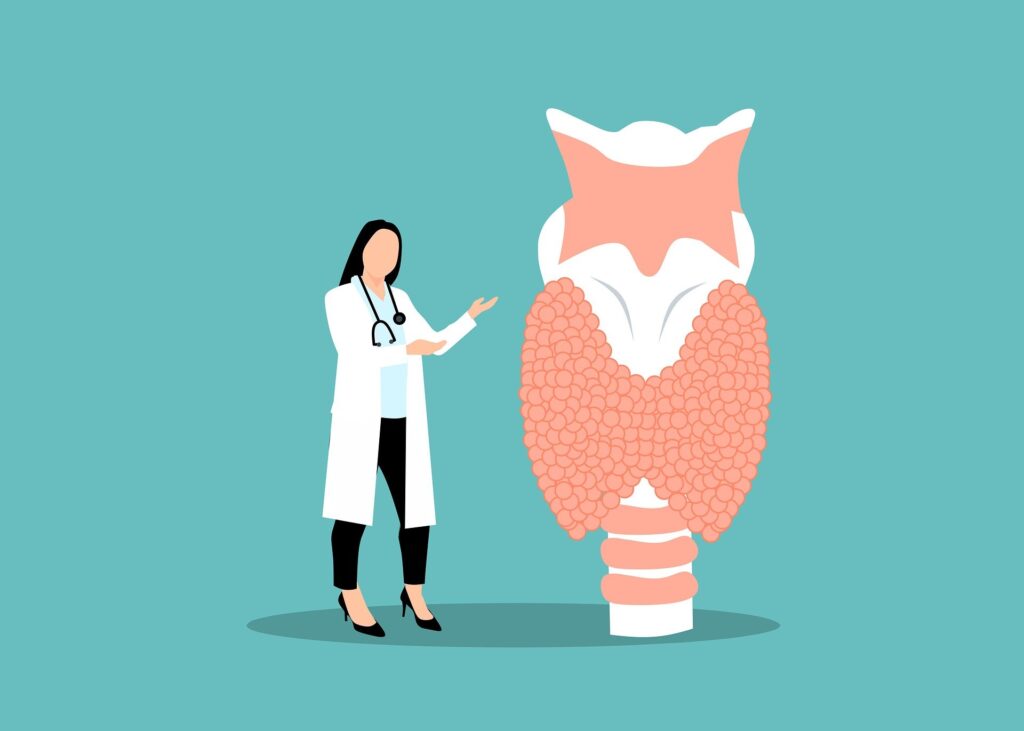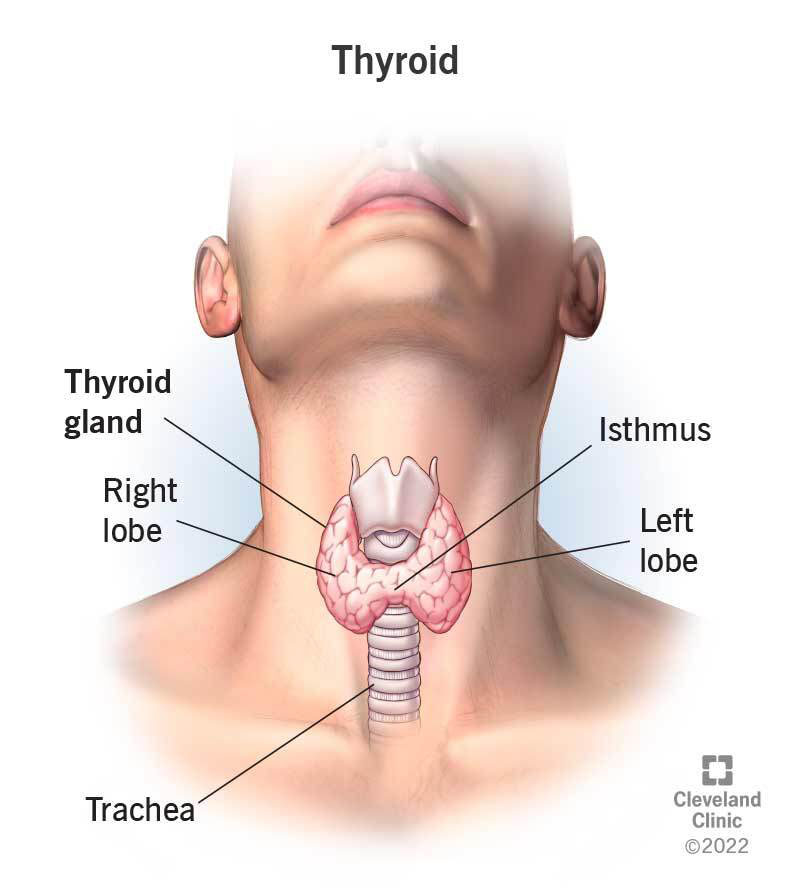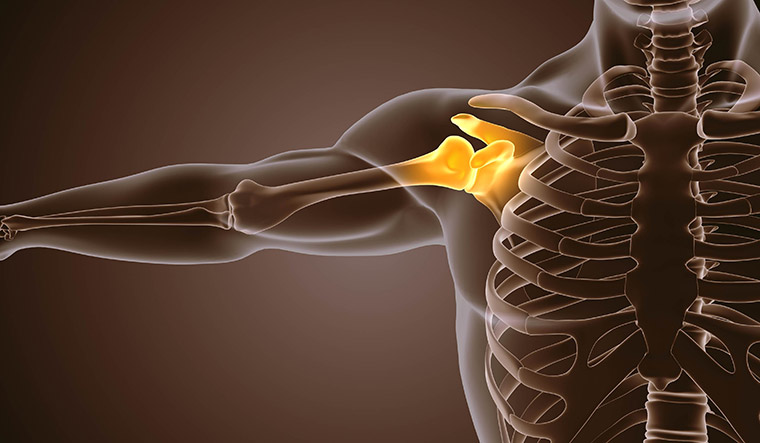
Thyroid troubles your lifestyle? In today’s time, we all want to be healthy. But due to various reasons like busy lifestyle, disordered eating habits, and lack of physical exercise, we keep falling ill. Some disease or the other always affects our lives and we keep getting worried. Apart from this, some diseases are related to the glands of our body. One of these is thyroid disease related to our thyroid gland.
Table of Contents
What is Thyroid?

The thyroid is a vital butterfly-shaped gland located at the base of the neck, just below the Adam’s apple. It plays a crucial role in the body’s endocrine system, primarily responsible for regulating metabolism, energy production, and overall hormonal balance. The thyroid gland produces two key hormones: thyroxine (T4) and triiodothyronine (T3). These hormones influence various bodily functions, including heart rate, temperature regulation, and weight management.
When the thyroid operates optimally, it helps maintain a healthy metabolism and energy levels, ensuring that the body functions efficiently. However, when the gland becomes overactive or underactive, it can lead to a range of health issues. Hyperthyroidism occurs when the thyroid produces excessive hormones, often resulting in symptoms like weight loss, anxiety, and rapid heartbeat. Conversely, hypothyroidism occurs when the gland is underactive, leading to fatigue, weight gain, and depression.
Thyroid disorders can affect individuals of all ages and genders, but they are particularly prevalent among women. Factors such as genetics, autoimmune conditions, and iodine deficiency can contribute to thyroid dysfunction. Diagnosing thyroid issues typically involves blood tests to measure hormone levels and assess gland function.
Understanding the thyroid’s role is essential for recognizing its impact on overall health. Early detection and management of thyroid disorders can lead to effective treatment and improved quality of life. This article will delve deeper into the structure and function of the thyroid gland, common disorders associated with it, and the importance of maintaining thyroid health for overall well-being.
What is the function of the Thyroid in our body?

The thyroid gland, a small, butterfly-shaped organ located at the base of the neck, plays a critical role in maintaining overall health and well-being. Despite its modest size, the thyroid’s influence on the body is profound, primarily through the hormones it produces: thyroxine (T4) and triiodothyronine (T3). These hormones regulate a variety of physiological processes, making the thyroid an essential component of the endocrine system.
Metabolism Regulation
One of the primary functions of the thyroid is the regulation of metabolism, which encompasses all the biochemical processes that convert food into energy. T3 and T4 control the speed of these metabolic processes. When the thyroid releases an adequate amount of these hormones, the body efficiently transforms calories into energy, supporting vital functions such as respiration, digestion, and circulation. An optimal metabolic rate helps maintain a healthy weight and energy levels, allowing individuals to perform daily activities effectively.
Growth and Development
The thyroid hormones are particularly important for growth and development, especially during infancy and childhood. They play a crucial role in brain development, skeletal maturation, and overall physical growth. Adequate levels of thyroid hormones are essential for cognitive function; deficiencies during critical developmental periods can lead to long-term health issues, including intellectual disabilities and growth retardation.
Temperature Regulation
Another essential function of the thyroid is its involvement in temperature regulation. The hormones produced by the thyroid help the body maintain a stable internal temperature. When the thyroid is underactive, or hypothyroid, individuals may experience cold intolerance due to a slower metabolic rate. Conversely, hyperthyroidism can lead to heat intolerance as metabolism speeds up. This temperature regulation is vital for the proper functioning of various bodily systems.
Calcium Homeostasis
The thyroid gland also plays a role in regulating calcium levels through the secretion of calcitonin, a hormone that lowers blood calcium levels when they are elevated. This function is particularly important for maintaining bone health, as calcium is a crucial component of bone structure. While the parathyroid hormone (PTH) increases blood calcium levels, calcitonin works to counteract this effect, ensuring balanced calcium homeostasis.
Cardiovascular Health
Thyroid hormones significantly influence cardiovascular health by regulating heart rate and blood pressure. A well-functioning thyroid ensures that the heart pumps effectively, maintaining good circulation and oxygen delivery throughout the body. Thyroid imbalances can lead to cardiovascular issues, including arrhythmias and hypertension, underscoring the importance of thyroid health in overall cardiovascular function.
Stress Response
Moreover, the thyroid is intricately connected to the body’s stress response. It interacts with other endocrine glands, such as the adrenal glands, to regulate how the body reacts to stressors. Efficient thyroid function can enhance resilience to stress, while dysfunction can contribute to feelings of anxiety, depression, and fatigue.
How many thyroid glands are in our body?
In the human body, there is typically only one thyroid gland, which is located at the front of the neck, just below the Adam’s apple. This butterfly-shaped gland is vital for producing hormones that regulate various bodily functions, including metabolism, growth, and development.
The thyroid gland consists of two lobes, the left and right lobes, connected by a thin strip of tissue called the isthmus. This structure allows the gland to efficiently produce and release hormones, specifically thyroxine (T4) and triiodothyronine (T3), into the bloodstream. These hormones play a crucial role in managing the body’s metabolism, energy levels, and overall hormonal balance.
While the thyroid gland is singular, it is important to note that there are related structures known as parathyroid glands. Typically, there are four parathyroid glands located on the back of the thyroid gland, though their number can vary slightly from person to person. The parathyroid glands are responsible for regulating calcium levels in the blood, functioning independently of the thyroid gland itself.
In rare cases, individuals may be born with thyroid gland abnormalities, such as a thyroid gland that is absent or ectopic (located in an abnormal position). However, these conditions are uncommon and do not change the fact that, under normal circumstances, there is only one thyroid gland in the body.
Two Types of Thyroid Disorders:
There are two types of disorders
- Hypothyroidism (underactive)
- Hyperthyroidism (overactive)
Understanding Hypothyroidism and Hyperthyroidism
Hypothyroidism: Understanding an Underactive Thyroid

Hypothyroidism is a common endocrine disorder characterized by an underactive thyroid gland that fails to produce sufficient amounts of thyroid hormones, primarily thyroxine (T4) and triiodothyronine (T3). These hormones are crucial for regulating various bodily functions, including metabolism, energy production, and growth. When hormone levels are low, the body’s metabolic processes slow down, leading to a range of symptoms and health issues.
Causes of Hypothyroidism
The causes of hypothyroidism can vary, with the most common being autoimmune diseases. Hashimoto’s thyroiditis, an autoimmune disorder, occurs when the immune system mistakenly attacks the thyroid gland, gradually impairing its ability to produce hormones. Other factors contributing to hypothyroidism include:
- Iodine Deficiency: Iodine is essential for thyroid hormone production. In regions where iodine is scarce, people may develop hypothyroidism.
- Thyroid Surgery: Surgical removal of part or all of the thyroid gland can lead to hormone deficiency.
- Radiation Therapy: Treatments for head and neck cancers may damage the thyroid, resulting in reduced hormone production.
- Medications: Certain medications, such as lithium or some anti-thyroid drugs, can interfere with thyroid function.
- Congenital Hypothyroidism: Some infants are born with an underdeveloped or absent thyroid gland.
Symptoms of Hypothyroidism
The symptoms of hypothyroidism can be subtle and may develop gradually, often leading individuals to overlook them. Common symptoms include:
- Fatigue: Persistent tiredness and a general lack of energy are hallmark signs.
- Weight Gain: Many individuals experience unexplained weight gain, even when their eating habits remain unchanged.
- Cold Intolerance: People with hypothyroidism may feel unusually cold, even in warm environments.
- Dry Skin and Hair: The skin may become dry and coarse, and hair loss can occur.
- Depression and Mood Changes: Mood swings, anxiety, and depression are common psychological symptoms.
- Constipation: Slowed metabolism can affect digestive function, leading to constipation.
- Muscle Weakness and Joint Pain: Individuals may experience muscle stiffness and discomfort in the joints.
Diagnosis
Diagnosing hypothyroidism typically involves blood tests to measure levels of Thyroid Stimulating Hormone (TSH) and free T4. High TSH levels coupled with low T4 levels indicate that the thyroid is underactive. A healthcare provider may also check for the presence of antibodies that suggest an autoimmune cause, such as Hashimoto’s thyroiditis.
Treatment
The primary treatment for hypothyroidism is hormone replacement therapy, usually in the form of synthetic levothyroxine. This medication restores normal hormone levels and alleviates symptoms. Patients typically require regular monitoring of TSH levels to ensure the dosage is appropriate. Adjustments may be necessary based on individual needs, age, and overall health.
Living with Hypothyroidism
Managing hypothyroidism involves a combination of medication, regular check-ups, and lifestyle adjustments. Many individuals find that a balanced diet, regular exercise, and adequate sleep can help manage symptoms effectively. It is also essential for patients to stay informed about their condition and maintain open communication with their healthcare providers.
Hyperthyroidism: Understanding an Overactive Thyroid
Hyperthyroidism is a condition characterized by the excessive production of thyroid hormones by the thyroid gland, which can lead to an acceleration of the body’s metabolism. This overactivity can cause a wide range of symptoms and health complications, affecting various bodily systems and overall well-being.
Causes of Hyperthyroidism
The most common cause of hyperthyroidism is Graves’ disease, an autoimmune disorder where the immune system mistakenly stimulates the thyroid gland to produce excessive amounts of hormones. Other potential causes include:
- Thyroid Nodules: These are lumps that can form within the thyroid gland. Some nodules may produce excess hormones independently of the body’s regulatory mechanisms.
- Thyroiditis: Inflammation of the thyroid can lead to temporary hyperthyroidism. This inflammation may be caused by viral infections or autoimmune conditions.
- Excessive Iodine Intake: Iodine is a critical component of thyroid hormones. Consuming too much iodine, often through medications or dietary supplements, can trigger overproduction.
- Medications: Certain drugs, such as amiodarone (used for heart conditions), can increase thyroid hormone levels.
Symptoms of Hyperthyroidism
The symptoms of hyperthyroidism can vary widely and may significantly impact daily life. Common signs and symptoms include:
- Increased Heart Rate: A racing heartbeat or palpitations can occur as the heart works harder.
- Weight Loss: Despite an increased appetite, many individuals experience rapid and unintentional weight loss.
- Heat Intolerance: Those with hyperthyroidism often feel excessively warm and may sweat profusely.
- Nervousness and Anxiety: Heightened levels of anxiety, irritability, and restlessness are common.
- Muscle Weakness: Individuals may experience muscle weakness, particularly in the upper arms and thighs.
- Sleep Disturbances: Difficulty sleeping or insomnia can be prevalent.
- Increased Appetite: Many individuals report an increase in hunger, often accompanied by rapid weight loss.
- Menstrual Changes: Women may experience irregular menstrual cycles.
Diagnosis
Diagnosing hyperthyroidism typically involves a combination of a physical examination, patient history, and blood tests. Healthcare providers usually check levels of Thyroid Stimulating Hormone (TSH) and free T4. Low TSH levels combined with elevated T4 levels indicate hyperthyroidism. Additional tests, such as a radioactive iodine uptake test, may be performed to determine the underlying cause of the condition.
Treatment
Treatment options for hyperthyroidism vary depending on the severity of the condition and the underlying cause. Common treatments include:
- Antithyroid Medications: Drugs such as methimazole or propylthiouracil can help reduce the production of thyroid hormones.
- Radioactive Iodine Therapy: This treatment involves taking radioactive iodine, which selectively destroys overactive thyroid cells, thereby reducing hormone production.
- Beta-Blockers: These medications can help manage symptoms such as rapid heart rate and anxiety, providing temporary relief while other treatments take effect.
- Surgery: In some cases, surgical removal of part or all of the thyroid gland may be necessary, especially if other treatments are ineffective.
Living with Hyperthyroidism
Managing hyperthyroidism involves regular follow-ups with healthcare providers, adherence to prescribed treatments, and lifestyle adjustments. Many individuals benefit from a balanced diet, regular exercise, and stress management techniques.
Why does thyroid disease occur?

Thyroid disease refers to various conditions that affect the thyroid gland, which plays a crucial role in regulating metabolism, energy, and growth through hormone production. Understanding why thyroid disease occurs is essential for prevention and effective management.
Autoimmune Disorders
One of the primary causes of thyroid disease is autoimmune disorders. In conditions like Hashimoto’s thyroiditis, the immune system mistakenly attacks the thyroid, leading to inflammation and reduced hormone production, resulting in hypothyroidism. Conversely, Graves’ disease causes the immune system to overstimulate the thyroid, leading to hyperthyroidism.
Iodine Deficiency
Iodine is vital for the synthesis of thyroid hormones. A deficiency can lead to hypothyroidism, particularly in areas where iodine is not adequately consumed. While iodine deficiency is less common in developed countries due to iodized salt, it remains a concern in some regions, potentially leading to goiter and other thyroid issues.
Genetic Factors
Genetics also play a significant role in thyroid disease. A family history of thyroid disorders can increase an individual’s susceptibility, indicating a genetic predisposition that may interact with environmental factors.
Environmental Triggers
Exposure to environmental toxins, such as heavy metals and certain chemicals, can disrupt thyroid function. Radiation treatment for head and neck cancers is another risk factor that can lead to thyroid dysfunction.
Hormonal Changes
Thyroid disease is more prevalent in women, particularly during hormonal changes like pregnancy and menopause. Conditions such as postpartum thyroiditis can occur after childbirth, highlighting the influence of hormonal fluctuations.
Thyroid Troubles? What are the measures to prevent thyroid?

Preventing thyroid disease involves a combination of lifestyle choices, dietary considerations, and regular health monitoring. Here are some effective measures to help reduce the risk of developing thyroid conditions:
1. Maintain Adequate Iodine Levels
Iodine is essential for the production of thyroid hormones. Ensure that your diet includes sufficient iodine by consuming iodized salt, seafood, dairy products, and certain grains. In areas where iodine deficiency is common, consider iodine supplements after consulting with a healthcare provider.
2. Eat a Balanced Diet
A balanced diet rich in fruits, vegetables, whole grains, and lean proteins supports overall health, including thyroid function. Foods rich in antioxidants, such as berries and leafy greens, can help protect the thyroid from oxidative stress.
3. Manage Stress
Chronic stress can disrupt hormonal balance, including thyroid function. Engage in stress-reducing activities such as yoga, meditation, or regular exercise to promote mental well-being and support hormonal health.
4. Regular Exercise
Regular physical activity helps maintain a healthy weight and can improve overall metabolic function. Aim for at least 150 minutes of moderate aerobic exercise per week, combined with strength training exercises.
5. Avoid Environmental Toxins
Limit exposure to environmental toxins, such as heavy metals and certain chemicals, which can disrupt thyroid function. Be mindful of the products you use in your home, opting for natural alternatives whenever possible.
6. Regular Health Check-Ups
Routine health check-ups are essential for early detection of thyroid issues. Discuss any family history of thyroid disease with your healthcare provider and consider regular screenings, especially if you notice symptoms like fatigue or weight changes.
Bad foods for Thyroid:
Maintaining a healthy thyroid is essential for overall well-being, as this small gland plays a crucial role in regulating metabolism, energy levels, and growth. Certain foods can negatively impact thyroid function, particularly for those with existing thyroid disorders. Here are some foods to be cautious about:
1. Cruciferous Vegetables
While vegetables like broccoli, cauliflower, and kale are generally healthy, they contain goitrogens, substances that can interfere with thyroid hormone production, especially when consumed in large amounts. Cooking these vegetables can reduce their goitrogenic effects, making them safer to eat.
2. Soy Products
Soy contains isoflavones, which may inhibit thyroid function by interfering with hormone production. While moderate consumption is typically fine for most people, those with hypothyroidism should monitor their intake of soy products like tofu and soy milk.
3. Gluten
For individuals with autoimmune thyroid disorders, such as Hashimoto’s thyroiditis, gluten can trigger inflammation and exacerbate symptoms. A gluten-free diet may benefit those sensitive to gluten, helping to improve overall thyroid health.
4. Processed Foods
Highly processed foods often contain additives, unhealthy fats, and sugars that can contribute to inflammation and weight gain. Maintaining a balanced diet with whole, unprocessed foods is vital for thyroid health.
5. Excessive Sugar
High sugar intake can lead to weight gain and insulin resistance, both of which can negatively impact thyroid function. Reducing sugar consumption can support overall metabolic health.
6. Caffeine and Alcohol
Excessive caffeine and alcohol can disrupt hormonal balance and impact thyroid function. Moderation is key to maintaining a healthy lifestyle.
Foods that support thyroid health:
Maintaining optimal thyroid health is essential for overall well-being, as the thyroid gland plays a crucial role in regulating metabolism, energy levels, and hormone balance. Including certain nutrient-rich foods in your diet can support thyroid function and help prevent disorders. Here are some foods to consider:
1. Iodine-Rich Foods
Iodine is vital for the production of thyroid hormones. Incorporate iodine-rich foods such as seaweed, fish (like cod and tuna), dairy products, and iodized salt into your diet. These foods help ensure that your thyroid has the necessary nutrients to function properly.
2. Selenium-Rich Foods
Selenium is an essential mineral that supports thyroid hormone metabolism and protects the gland from oxidative stress. Foods high in selenium include Brazil nuts, sunflower seeds, and fish such as tuna and sardines. Just a small amount of Brazil nuts can provide more than the daily recommended intake of selenium.
3. Zinc-Rich Foods
Zinc plays a crucial role in thyroid hormone production. Foods rich in zinc include shellfish (like oysters and crab), red meat, poultry, beans, nuts, and whole grains. Including these foods in your diet can support overall thyroid function.
4. Fruits and Vegetables
Antioxidant-rich fruits and vegetables, such as berries, leafy greens, and sweet potatoes, help combat oxidative stress and inflammation. These foods provide essential vitamins and minerals that support thyroid health and overall well-being.
5. Healthy Fats
Incorporating healthy fats, like those found in avocados, olive oil, and fatty fish (like salmon), can help reduce inflammation and support hormonal balance. Omega-3 fatty acids, in particular, are beneficial for thyroid function.
